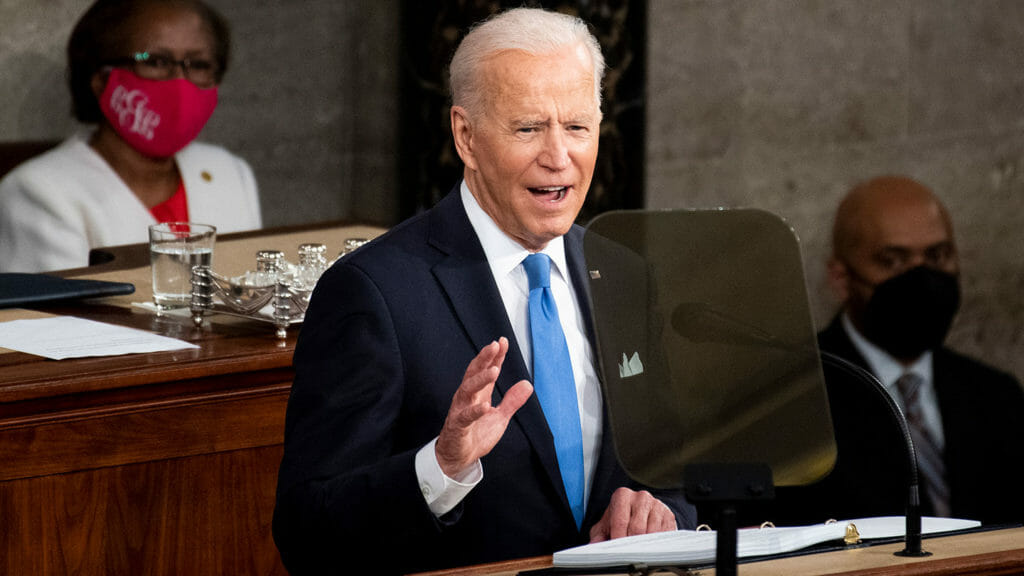
Nursing home operators bracing for criticism during President Biden’s first State of the Union speech Tuesday night got it, but his comments were far less extensive than many had feared.
Just over halfway into his 62-minute address before Congress, Biden vowed to crack down on private-equity owners of nursing facilities. He also said nursing homes will be subject to tougher Medicare oversight, something the White House unveiled in a sprawling reform brief Monday.
“As Wall Street firms take over more nursing homes, the quality in those homes has gone down and costs have gone up. That ends on my watch,” Biden said emphatically.
“Medicare is going to set higher standards for nursing homes and make sure your loved ones get the care they deserve and that they inspect and will get looked at closely,” he added.
Although some attendees rose to their feet in approval dozens of times during the speech, there was no applause or other discernible response during the 19-second nursing home segment. The president quickly moved beyond it and into promises about building the economy and better training workers.
Ironically, he led into the nursing home segment after saying there would be a “crackdown” on “companies overcharging American businesses and consumers.” This is something nursing home operators have appealed to the Federal Trade Commission for because some contract nursing agencies have been charging exorbitant rates. It was clear, however, that Biden was referring to material shippers, some of whom had jacked up prices by 1,000% during the pandemic, and not anything healthcare-related.
Atypical focus
For long-term care providers, it was nonetheless a historic speech. Although nursing homes were referred to in just a few lines, there was more meaning behind them than any nursing home references in a State of the Union Address in at least a generation.
The day before the address, the administration proposed some 20 new rules, toughening up measures or simply points of emphasis that nursing home operators may have to deal with. Within a year, staffing minimums are to be determined. New payment changes will be proposed based on staffing and resident experiences. Private rooms will be promoted and there will be a campaign to reduce the inappropriate use of antipsychotics.
Individual penalties on poor-performing facilities would rise from from $21,000 to $1 million per instance under a proposal that would require Congressional approval. More details about corporate owners will be demanded.
A White House briefing sheet took an especially tough stance on private equity owners of nursing homes on Monday.
“Private equity firms have been buying up struggling nursing homes, and research shows that private equity-owned nursing homes tend to have significantly worse outcomes for residents,” the White House briefing said.
It noted that private equity firms’ investment in nursing homes “ballooned” from $5 billion in 2000 to more than $100 billion in 2018. About 5% of all nursing homes are now owned by private equity firms, it added, a statistic that providers also point to, claiming such a small number is getting an inordinate amount of attention.
The administration also cited studies that found private equity ownership led to more emergency room visits and hospitalizations, higher likelihood of death, more use of antipsychotics, fewer staffing hours and increased government spending.
“Too often, the private equity model has put profits before people — a particularly dangerous model when it comes to the health and safety of vulnerable seniors and people with disabilities,” the White House statement said.
AHCA dissent
The nation’s largest nursing home association put the blame for any perceived provider shortcomings back on government policies and reimbursement levels.
“Calls for increased government scrutiny, regulations and fines do not recognize the nature of COVID-19 and how public health officials failed to prioritize nursing homes for resources before and during the pandemic,” said Beth Martino, Senior Vice President of Public Affairs for the American Health Care Association / National Center for Assisted Living, in a statement emailed to McKnight’s after the State of the Union address.
“Private equity firms only own a small percentage of nursing homes, and, in fact, deals are overwhelmingly focused on other aspects of the healthcare system,” she added. “The real issue is that Medicaid has chronically underfunded nursing homes for years, leaving facilities on the brink of closure. More will close soon if they don’t receive proper government support coming out of this pandemic.”
She noted that the association long ago had recommended its own “meaningful solutions to transform” U.S. nursing homes.
“We stand ready to work with policymakers to make these proposals a reality,” she said.
Information pipeline
The Centers for Medicare & Medicaid Services issued a statement leading up to Tuesday night’s address declaring that it will be leading a “charge” to set minimum staffing requirements, enhance oversight and accountability, and “make facility ownership more transparent so that potential residents and their loved ones can make informed decisions about care.”
The agency said it will outline more details of its “nursing home vision and implementation strategy” through an upcoming series of national stakeholder calls, listservs, and “collaboration” with residents, families, providers and other stakeholders.
As part of that campaign, a National Nursing Home Stakeholder Call will take place at 3 p.m. March 10.



